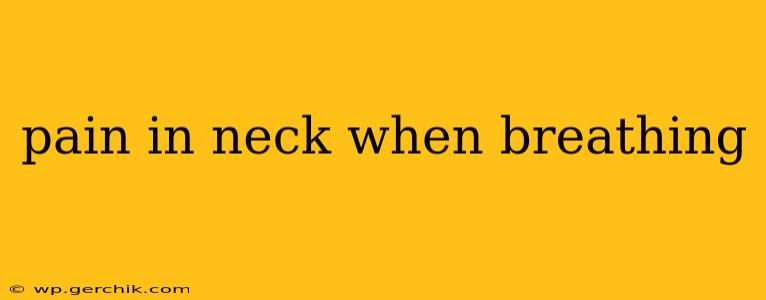Experiencing pain in your neck when you breathe can be alarming and debilitating. This symptom isn't a disease itself, but rather a sign that something is amiss in your body. The discomfort can range from a dull ache to a sharp, stabbing pain, and its intensity can vary depending on the underlying cause. Understanding the potential reasons behind this pain is crucial for seeking appropriate medical attention and finding relief. This comprehensive guide explores the various causes, diagnostic methods, and treatment options for neck pain associated with breathing.
What Causes Neck Pain When Breathing?
Several conditions can trigger neck pain that worsens with inhalation or exhalation. These range from relatively benign issues to more serious medical problems. Let's delve into some of the most common culprits:
Musculoskeletal Problems:
- Muscle Strain or Sprain: Overexertion, poor posture, or sudden movements can strain the neck muscles, leading to pain that intensifies with breathing, especially deep breaths. This is often accompanied by stiffness and limited range of motion.
- Cervical Spondylosis: This age-related degenerative condition involves the wear and tear of the neck's vertebrae and discs. As the discs degenerate, bone spurs can form, pressing on nerves and causing pain that radiates to the neck and worsens with movement, including breathing.
- Whiplash: This injury, typically resulting from a car accident, can cause damage to the neck muscles, ligaments, and even vertebrae. The resulting pain can be significantly aggravated by breathing.
Respiratory Issues:
- Pleuritis (Pleurisy): This inflammation of the pleura (the lining of the lungs and chest cavity) causes sharp chest pain that often radiates to the neck and worsens with breathing. Deep breaths are particularly painful.
- Pneumonia: This lung infection can cause chest pain that may be felt in the neck, along with other symptoms like cough, fever, and shortness of breath.
- Pulmonary Embolism: A blood clot in the lungs is a serious medical emergency that can cause sudden chest pain that may radiate to the neck and shoulder, along with shortness of breath and rapid heart rate. This requires immediate medical attention.
Other Potential Causes:
- Referred Pain: Pain originating from other areas, such as the heart, esophagus, or even the jaw, can sometimes be felt in the neck.
- Anxiety and Stress: Increased muscle tension due to anxiety or stress can trigger or worsen neck pain, potentially making breathing more uncomfortable.
- Tumors: In rare cases, tumors in the neck or chest can compress nerves or other structures, leading to neck pain that's aggravated by breathing.
How is Neck Pain When Breathing Diagnosed?
Diagnosing the cause of neck pain that worsens with breathing requires a thorough evaluation by a healthcare professional. The diagnostic process typically involves:
- Physical Examination: A doctor will assess your neck's range of motion, palpate for tenderness, and check for any abnormalities.
- Medical History: Providing a detailed account of your symptoms, including when they started, their intensity, and any associated symptoms, is essential.
- Imaging Tests: X-rays, CT scans, or MRIs may be used to visualize the neck's structures and identify any underlying conditions like cervical spondylosis or tumors.
- Blood Tests: These may be conducted to rule out infections like pneumonia or other systemic conditions.
What Treatments Are Available for Neck Pain When Breathing?
Treatment for neck pain associated with breathing depends entirely on the underlying cause. Options can include:
- Over-the-Counter Pain Relievers: Nonsteroidal anti-inflammatory drugs (NSAIDs) like ibuprofen or naproxen can help reduce pain and inflammation.
- Rest and Ice: Applying ice packs to the neck can help reduce swelling and pain. Resting and avoiding strenuous activities can also help.
- Physical Therapy: A physical therapist can teach you exercises to strengthen your neck muscles, improve posture, and increase your range of motion.
- Prescription Medications: For more severe pain or underlying conditions, a doctor may prescribe stronger pain relievers or other medications.
- Surgical Intervention: In rare cases, surgery may be necessary to address conditions like severe cervical spondylosis or tumors.
When Should I Seek Medical Attention?
While some cases of neck pain associated with breathing may be minor and resolve on their own, it's crucial to seek medical attention if:
- The pain is severe or sudden.
- You experience shortness of breath.
- You have a fever or chills.
- The pain radiates to your arm or jaw.
- You have a history of heart or lung problems.
This information is for general knowledge and does not constitute medical advice. Always consult with a healthcare professional for diagnosis and treatment of any medical condition. They can accurately assess your specific situation and recommend the most appropriate course of action.
